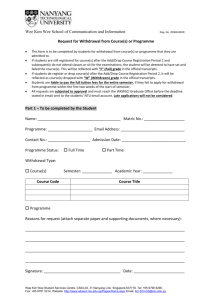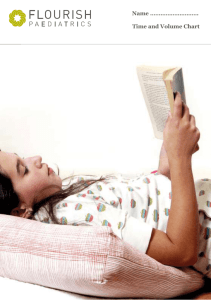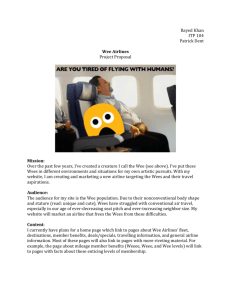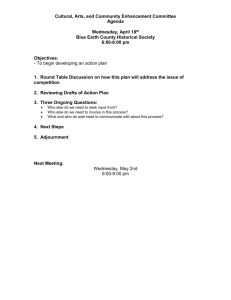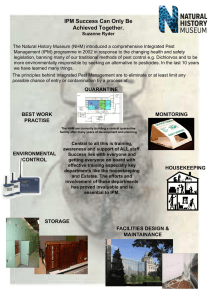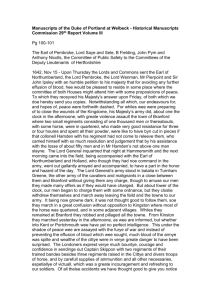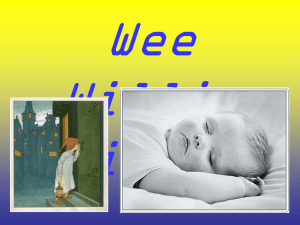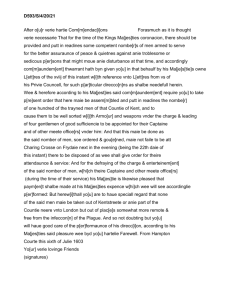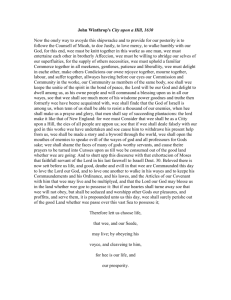Parent Handbook - Wee Care Children's Center
advertisement
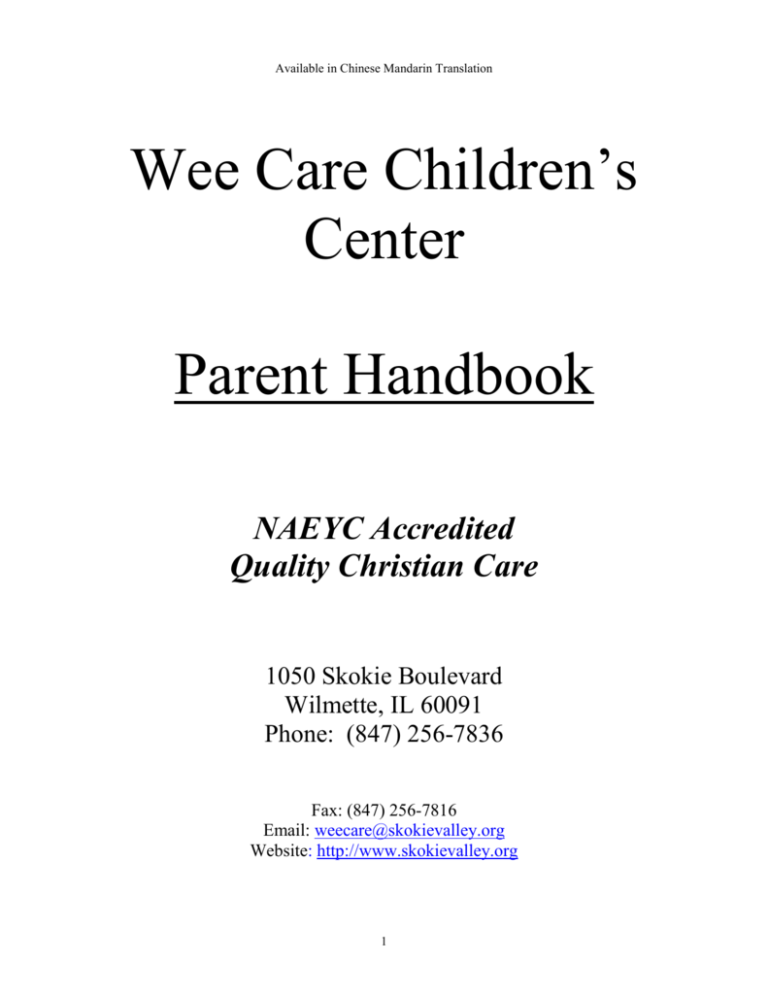
Available in Chinese Mandarin Translation Wee Care Children’s Center Parent Handbook NAEYC Accredited Quality Christian Care 1050 Skokie Boulevard Wilmette, IL 60091 Phone: (847) 256-7836 Fax: (847) 256-7816 Email: weecare@skokievalley.org Website: http://www.skokievalley.org 1 NUT-FREE POLICY Wee Care Children’s Center recognizes that nut allergies represent a health and safety hazard, which can have serious consequences for those who have such an allergy. In order to protect our students, staff and visitors from an environment that may be harmful to them because of such an allergy, Wee Care prohibits the use, serving and bringing in of any product containing nuts, products that may contain traces of nuts and products using nut oils. The following are guidelines for all parents/guardians of students at Wee Care Children’s Center, if followed, will minimize the risk of an allergic, possibly life-threatening, reaction to a member/s of the school population. DO NOT BRING TO WEE CARE: o Any fresh nut products o Any spread containing nuts (all nuts, e.g.: peanut butter, almond butter, or Nutella) o Packages of trail mix and any other product that lists nuts as an ingredient o Recycled containers that may have contained nuts, e.g.: cereal or peanut butter jars o Any product that may contain traces of nuts We understand the importance of celebrating students’ birthdays here at Wee Care. As we celebrate, we do want to acknowledge persons who are allergic to nuts and we also want to lean toward healthier snacks. We also offer foods to the children according to the USDA’s CACFP food guidelines. It is with these reasons that we have put together a list of approved foods to bring in for birthdays and special occasions. We thank you for your cooperation. APPROVED BIRTHDAY AND SPECIAL OCCASION TREATS o Fruit cups o Applesauce cups o Honey Maid or Kraft Cinnamon Graham Crackers with Applesauce Dip o Kraft Handi-Snacks with Cheese Dip o Minute Maid Juice Bars, Fruit & Cream Swirls o Rainbow Sherbet Treats & Juicy Juice Frozen Juice o Tropicana Fruit Juice Bars o Welch’s Fruit Juice Popsicles o Whole fruits o Store-bought foods For more information about USDA’s food guidelines, please visit: www.mypyramid.gov/kids ADMISSION Admission is open to all children between the ages of two to six years old whose parents believe an early Christian education is important. Admission is on a first come / first serve basis and is approved by the Director only after an application has been filed and a personal meeting with at least one parent or guardian and the child to be enrolled is held. A position in the center is reserved for your child upon the receipt of the registration fee and a one week deposit as well as the required forms. We desire a smooth transition for your child into our center and therefore require at least two visits in the classroom before the official start date. No information about any child will be released to anyone without the consent of the parent. The faculty are the only ones who have access to these files. 2 HOURS We are open from 7:00 AM-6:00 PM, Monday through Friday. Please observe opening and closing hours. There is a late charge of $1.00 per minute after closing. This is to be paid to the staff member staying with the child at the time of pick up or the following morning. This is strongly enforced. If a parent is more than 10 minutes late in picking up and this becomes a habitual problem, the parent(s) will speak with the Director and a decision will be made for the family to find another site. In order to protect yourself from being charged for being late, please maintain a backup plan. Talk to some of the other parents that you see regularly as you pick up your child to inquire if you can have them pick up your child if you are to be late. Use the Family Directory to help you connect with any other families that may live in your area or that you may know. Parents are required to sign their child in and out each time their child is brought or picked up from the center. Contact with a teacher before leaving is also requested to ensure the child is safely dropped off or picked up. You must bring your child into his/her classroom. If a different person will be picking up your child, please give the teacher or the Director the name and phone number of the person. We will ask for photo identification before releasing your child to the person. For the safety of the children and other families, please park your vehicle before bringing in your child. The morning time is when the child experiences Circle, Bible Time and an explanation of the learning that will take place. In order for your child to have an idea of how his or her morning will be, it is best that your child come to school on or before 9:00 a.m. If there is a circumstance where you cannot bring your child by 10:00 a.m., please notify the teacher in advance. Prior arrangements need to be made with the Director if your child will not arrive before lunch on a given day. CLASSROOMS Wee Care has two classroom offerings. Our younger class is referred to as the Bunnies and our older classroom is referred to as the Bears. The Bunnies class is designed to meet the needs of 2 and 3-yearolds, who may not be potty-trained and will benefit from a smaller group size and ratio setting. The Bunnies curriculum focuses on an introduction to a school setting, taking into consideration where the child is developmentally; providing experiences to take them to the next level. The Bunnies enjoy a wide variety of language and literacy skills, art and music experiences, exploring nature, and learning self-help skills, such as toileting. The Bears classroom is a multi-age classroom consisting of 3 ½ -5 year olds. The Bears enjoy learning about the calendar, pre-reading and writing skills, science, music, art, social studies and math experiences. The Bears classroom has a pet hermit crab. The hermit crab is fed daily and his home is cleaned regularly. Reptiles are not allowed in the center because they carry the risk for salmonella. Please inform the Director or the Assistant Director if your child has an allergy to hermit crabs. If you would like to bring in a pet, please let the Director know. You will need to have documentation that the animal is immunized and is appropriate for children in our age group. PHILOSOPHY Wee Care Children’s Center is an affiliate of the Skokie Valley Baptist Church located at 1050 Skokie Blvd., Wilmette, IL 60091. The Church Office telephone number is (847) 256-1050. We are under the direct supervision of the volunteer Wee Care Board that is appointed by the Skokie Valley Baptist Executive Board. The Wee Care Board of Directors consists of a chairperson, four directors and the Pastor of Family Ministries. We, together, believe a child’s work is play. Through play, a child can expand concepts, establish positive feelings, increase physical and motor skills, and learn to be more expressive and develop friendships. At the core of our curriculum is the belief that a caring and nurturing environment 3 encourages the child to feel free to explore his world and develop healthy relationships with peers and teachers. Our goal is to create an enriched environment in which each child will grow emotionally, spiritually, socially, intellectually and physically. Every family is an important member of our school community and we desire to have open communication with our families so that we are able to support and help prepare your child for lifelong learning. FACILITIES The rooms in which the Center is located have been designed for a classroom situation and are ideal for our needs. Each room is spacious, clean and equipped with toys and educational equipment. Each classroom is designed with interest centers to allow the child to explore various interests individually, or in small groups. Our outside play area resembles a park with a large grassy area for running and playing, a chipped area with various climbing equipment and sand boxes as well as an area for bike riding. There are scattered trees to provide shade during the summer months. During inclement weather or poor air quality alerts, playtime will be in the gymnasium where we play with bikes, balls, balance beams, and parachutes that promote gross motor activities. Children will have opportunities to practice fire drills and other emergency procedures. Each morning when the child arrives to Wee Care, they are required to wash their hands before starting their day. BIBLE TIME An important part of our day is “Bible Time.” This is a time where the children learn truths from the Bible. We believe that knowing God’s love is the initial step for establishing a healthy understanding of God and caring relationships with people. During that time and other times throughout the day, we teach children the truths of the Bible. FACULTY Our faculty has been chosen for their dedication to the Lord’s work, and their high quality of education and experience with children. Our faculty has a genuine love and understanding of children. They fully recognize the opportunity and responsibility for encouraging the children’s growth. In addition a high priority is placed on continuing education through seminars, workshops and college courses. POLICIES REGARDING CHILD ABUSE Distinguishing between Abuse and Discipline All children need discipline in order for them to grow up and become productive members of society, subject to society’s norms, values and rules. Discipline is designed to teach appropriate behaviors and is a learning process. Abuse on the other hand, is not a learning process. Through inflicting pain, it is designed to stop behavior. Alternative, corrective behavior is not taught. In this way, abused children do not learn correct behavior. What they learn is to avoid punishment. Responding to extreme or inappropriate parental or caregiver actions is the intent of the reporting law. The reporting law is not to be used to interfere with appropriate discipline. What are considered to be abusive are actions which are excessive or forceful enough to leave injuries. Distinguishing Abuse from Accident Children are curious and fearless and the very nature of childhood invites accidents. They are constantly on the move. A child can approach danger without recognizing it because a child’s motor 4 skills usually outpace their cognitive skills. The following is a guide to help distinguish between accidental and non-accidental injuries. Consider these points when observing an injury you suspect might be the result of abuse: Where the injury is located Certain locations on the body, such as the knee, elbow, shin and forehead, are more likely to sustain accidental injury. The back, thighs, genital area, buttocks, back of the legs, or face which are protected body parts and soft tissue areas, are less likely to come into contact accidentally with objects which could cause injury. The frequency and number of injuries The cause for concern is greater when there are a greater number of injuries. A number of different injuries are unlikely, unless the child is involved in a serious accident. There may be an indication of abuse over time when dealing with multiple injuries in different stages of healing. The shape and size of the injury A stick, a board, a belt, and a hair brush are familiar objects that may cause non-accidental injuries. The resulting marks will bear resemblance to the object used. Marks resulting from bumps and falls, which are accidental, usually have no defined shape. Describing how the injury occurred There should be a reasonable explanation of how an injury occurred that was accidental, and it should be consistent with the appearance of the injury. There is cause for concern when the description of how the injury occurred and the injury are inconsistent. An example given would be that it would not be likely that a fall from a chair onto a rug would produce bruises all over the body. The child’s developmental capability is consistent with injury A child’s ability to engage in activities, which can cause injury, increases as he or she grows and gains new skills. Compared to an eight-year-old who has discovered the joy of climbing trees, a toddler trying to run is less likely to suffer bruised knees and a bump on the head. To self-inflict a bruise, a two-week-old infant does not have the movement capability. Remember, accidents do happen. Adults are not perfect. Injuries that might have been avoided sometimes occur. When the explanation is inconsistent with the injury or the child’s developmental abilities there is cause for concern when injuries recur. What are the four types of abuse? 1. Physical abuse 2. Emotional abuse 3. Verbal abuse 4. Negligence What happens when a faculty member suspects a parent of abuse? By law Wee Care faculty are mandated reporters. If a faculty member has reasonable cause to believe a child known to them in their professional capacity may be an abused child or neglected child, they shall immediately inform the Director. Together with the Director, the decision will be made to inform DCFS. 5 What happens when a faculty member is accused of an act of abuse? 1. The accusatory party will be asked to write out a description of what they had witnessed. 2. The faculty member that is accused will be asked to write out a description of the day. 3. Other faculty members that were eyewitnesses to the activity of the day will be asked to document what they had seen. 4. The accused faculty member will immediately be put on leave. Leave time will be paid or unpaid depending on the outcome of the investigation. 5. The Department of Children and Family Services (DCFS) and the Wee Care Board of Directors will be contacted immediately and given all current information known at that time. 6. Wee Care Children’s Center will cooperate fully with DCFS while the investigation takes place and will keep all parties involved informed of the progress. 7. Once the investigation is complete, the staff member will either return to work or will be terminated upon the outcome of the investigation. HEALTH The state of Illinois requires a physical examination and strongly recommends a TB test six months prior to child care enrollment. No child will be enrolled without a completed physical. We have the medical forms that you will need. Any child not well enough to participate in the activities of the day should remain at home until they have recovered. Please call if your child will be absent. All parents will be required to sign a Health Care Policy. If a child enrolled in school has a contagious disease, illness, or accident we will notify the parents immediately. If the child is exhibiting symptoms that require them to be separated from the other children, they will be waiting to be picked up in the office. Children sent home with an illness may not return to Wee Care until he/she has been symptom-free for 24 hours. This includes any fever that he/she may have. If an antibiotic is prescribed, they must have been on it for 24 hours before returning to school. Any medication whether prescription or over the counter, must be in the original bottle and a medical form MUST be filled out by the parent and signed. No medication will be issued without the proper consent forms. We ask that you sign a medical release form for treatment of your child in case you cannot be reached. Minor injuries will be treated with first aid by the staff and an accident report will be filed. CLOTHING Please send a complete extra set of clothes, including underwear and socks, for your child. Be sure to label each piece of clothing. During winter months we do go outside so it is important that your child have a full set of outdoor winter clothing that includes boots, hat, scarf, gloves and snow pants or a snow suit. During the summer we do enjoy water play so a bathing suit, towel and water shoes will be needed during those months. Please keep your child’s extra clothes appropriate for the season. NAP TIME Every day after lunch, we have a two-hour nap/quiet time. We require that each child lie quietly on his or her cot for the first hour of this time. If a child has not fallen asleep after 1 hour, they are allowed to get up and have quiet time with books, puzzles or quiet table activities for the remainder of the time. Please send a child sized blanket and a small pillow with your child for this purpose. We provide the sheets. They may bring a stuffed animal or doll as a sleepy toy. Small toys such as cars or figurines are not good choices for nap time. 6 MEALS/SNACKS Each day we serve a nutritious lunch and a morning and afternoon snack. Plum Catering provides our lunches each day that meets all the DCFS and USDA requirements. They provide a variety of ethnically diverse meals. Meals are served family style allowing the children the ability to help themselves to seconds if they would like more as well as learn social skills. Children are encouraged to have pleasant conversation with their peers and teachers as they enjoy an unhurried lunch time. A monthly menu is posted for both snacks and lunches and a copy is sent home. (Please note that breakfast is not served and should be eaten prior to coming to school.) If you child is allergic to any foods that may be served during snack or meal times, please let the Director or Assistant Director know. The child’s allergies will be posted in each classroom and in the kitchen to ensure your child’s safety. Feel free to bring in foods from home that will supplement your child’s nutrition and diet. Any foods that are brought from home will need to be labeled with your child’s first and last name. Please ask a staff member if you have additional questions and refer to the nut-free policy stated on page 2. EMERGENCY CLOSING/EMERGENCY PROCEDURES Occasionally we may be required to close due to weather or unsafe conditions at the center (if for example: electric or water problems.) We will notify the Emergency School Closing Center on WBBM and WGN—online at www.emergencyclosingcenter.com We also have monthly fire drills and severe weather drills several times a year to prepare the children for emergency situations. NON-DISCRIMINATION POLICY Wee Care Children’s Center shall admit children of any race to all the rights, privileges, programs, and activities generally accorded or made available to children at the facility. We shall not discriminate on the basis of race or religion in administrations of any of its policies or programs. Children with varying abilities will not be discriminated against but every effort will be made to work with the parent to help meet their child’s needs. CURRICULUM We use Creative Curriculum®. Our curriculum is designed to develop positive social skills and a broad base of experiences so each child will be prepared to enter a kindergarten classroom when they leave our center. These activities include work with the calendar, colors, rhythm, language development, self-awareness, social development, music, large and small motor development, prereading and pre-math developmentally appropriate experiences as well as Bible teaching. Each day there will be individual and group playtime (inside and outside) and creative handiwork. Field Trips are planned according to classroom themes and will occur throughout the year. Field Trips outside the building are planned for the older classroom (Bears) while special guests are invited into the center to bring additional experiences to the younger classroom (Bunnies). Walking trips are also taken occasionally. Permission slips will be sent home for any of these events inviting our parents to join us if at all possible. If your child is just beginning to learn English, please provide the teachers will some common phrases that we can say to him/her in his/her most comfortable language. If you have any other tools, games, or books in the home language, feel free to bring them into the classroom to share. We want your child to feel comfortable and included in our classroom. 7 ASSESSMENT There are many purposes for assessment. First and foremost, we want to see a holistic view of what your child can do. Secondly, the teachers use it to plan their lessons and activities. Lastly, the assessment helps the program to review our curriculum. Our assessment system is a combination of Creative Curriculum’s assessment as well as work sampling. Each child has their own portfolio. In this portfolio, we place pictures of your child or samples of your child’s work that fulfill various Illinois Early Learning Standards. These portfolios are updated monthly and are fully available to you to look at. Creative Curriculum’s assessment consists of various checklists of benchmarks your child should be reaching at their age. There are 38 objectives that cover 9 areas: Social-Emotional, Physical, Language, Cognitive, Literacy, Mathematics, Science and Technology, Social Studies, the Arts and English Language Acquisition. These 38 objectives are expectations of children from birth through kindergarten. You will be given a copy of these 38 objectives for your own reference. Formal assessments will be completed 4 times a year using the Creative Curriculum’s 38 objectives. There is additional assessment done for children that will be entering kindergarten the following fall. It is used to determine their readiness for kindergarten. Formal assessments will be kept in the office in a locked cabinet. During Parent/Teacher Conferences, you will receive a sheet of paper informing you of your child’s progress that is determined through Creative Curriculum and your child’s portfolio. You will be able to see your child’s individual portfolios and how the teachers reached their conclusions. The first conference in November will be to show you where you child is at the beginning of the year. Feel free to give input as to how we can plan for you child’s year. Let us know of any concerns you have or areas you would like us to focus on. The second conference in March will show you various progress points your child has made throughout the year. The third conference in will show you how your child has progressed throughout the school year. You will also be given ideas and suggestions of what to do over the summer if your child is not going to Wee Care’s Summer Camp. We strongly encourage you to be in continual communication with your child’s teacher(s) in their progress. If you notice anything at home that you think or know is significant, please let your teacher(s) know. During the conference, give your input and your opinions as to your child’s progress. This is a partnership and we value your opinion, observations and thoughts. DIAPERING/TOILET TRAINING If your child requires diapers, you need to bring in commercially available disposable diapers or pullups or cloth diapers for the staff to use. We begin changing a child’s diaper two hours from the time they enter the center unless the child has a bowel movement before that time in which case we would change them immediately. A record of the times and the condition of the change are included as part of our daily report form. Any soiled cloth diapers or clothing will be placed in a plastic bag for you to launder when you go home that day. We will place these on your child’s hook in the entry hallway. We will inform you when your child need additional diapers or wipes on the daily report. We encourage you to use whichever type of diaper (disposable or cloth) that you feel most comfortable with. When you are ready to toilet train your child, we will set up a meeting to determine a time frame for pull-ups and then moving into training underwear. It is our desire to work closely with the parents and have a consistent method for the training process. 8 GUIDANCE/DISCIPLINE Wee Care believes in a loving yet firm discipline. We feel responsible for doing our part to teach respect of and obedience to authority to your child/children as well as respecting the children around them. We believe that discipline encompasses all of the following actions to develop self-fulfilling, productive, and socially acceptable behaviors in children. 1. Talk to the child 2. Redirection 3. Remove from the group activity (children are removed from their play within the classroom) to talk with the teacher about the choices the child has made and help the child work through the issue. Limits and consequences will be made clear and understandable to the children. At no time with the staff use physical punishment or psychological abuse or coercion in their interaction with the children. Children will not be disciplined for toilet accidents or deprived of a meal, rest, or the bathroom. Wee Care is committed to a supportive environment where young children can experience and grow. That commitment and basic respect for children is reflected in discipline polices and procedures. The following has been developed to create a caring environment that teaches children to behave in responsible ways to feel good about themselves: 1. Set realistic expectations for young children’s behavior 2. Create an environment that enhances the probability that children will behave in appropriate ways. 3. Focus on positive communication techniques to gain children’s cooperation. 4. Give children alternatives to turn non-constructive situations into constructive ones. 5. Use natural and logical consequences to motivate and empower children to make responsible decisions about their behavior. 6. Teach preschool children to use problem-solving skills and strategies to resolve conflicts. If a child is having continued difficulty adjusting to the group life of the school, a parent meeting will be set up along with a referral for a developmental screening. After these measures have been taken and the child still experiences difficulty, the Director and the parent(s) will put forth efforts to place the child in a site that will be most suitable for him or her. If discipline becomes a problem and there is concern that harm will come to the child, staff, or another child, a conference will be held with the parents to see what can be done to help this child. Any child, who after attempts have been made to meet the child’s needs, demonstrates inability to benefit from the type of care offered at this facility, or whose presence is detrimental to the group, shall be discharged from the facility. In all instances, when this facility decides that it is in the best interest of the child to terminate enrollment, the child and parents needs shall be considered by planning with the parents to meet the child’s needs when he/she leaves the facility. (This includes referrals to other agencies or facilities.) FEES AND PAYMENT A $75.00 registration fee is charged per child or $100.00 per family. This along with a one week deposit reserves a place for your child in the center. Deposits will be credited to the last month’s 9 tuition when your child will be dis-enrolling from the program after attending the full school year. This is paid upon enrollment along with a one week deposit and application. Complete payments may be made on the first day of the month, or half on the first day of the month and half on the 15th day of the month. Checks should be made to Wee Care Children’s Center. Any payments made after the 25th will be subject to a $25.00 late fee. (Talk to the Director if special arrangements are needed for payment.) There is a $25.00 service fee for all returned checks as well as the bank fee. If three checks are returned, you will then be required to pay in cash or with a money order. There is an annual registration fee of $50.00 per child or $75.00 per family and deposits are renewed for the new school year. Day care expenses are the same whether or not your child is present. We are a non-profit organization and daycare expenses are averaged for the year, thus no holiday credits are given. We divide our year according to the school calendar starting the Tuesday after Labor Day and ending the second Friday of June. Our summer camp program runs from mid June through mid-August. There is a separate one time per year fee to cover the additional costs for the summer program. Some of the additional items covered include field trips or guests, water bottles, camp shirts, sun screen and bug spray. A summer camp form is sent out in the spring to let the center know your family’s summer plans. (The weeks after summer camp is finished and the fall school year begins is considered the transitional week.) SICK and VACATION There are no sick and/or vacation credits because even though your child is on vacation or has a sick day, Wee Care is still in operation. PARENT COMMUNICATION/CONFERENCES First and foremost, this center has an open door policy. The teachers, the Director, and the Assistant Director are willing to talk with you about any questions or concerns you may have about your child. Please let any of the staff know when you would like to talk. A newsletter and calendar are sent out monthly to inform parents of school happenings and events that might be taking place. Each child has a mailbox located by the entrance for any school communication such as newsletters, tuition statements, etc. If you would like anything translated, please let the Director or Assistant Director know. Daily activity reports that include diapering/training information, food consumed, nap and activities enjoyed by your child are sent home each day in our Bunny classroom (2-3 year olds). A weekly newsletter is sent home each week in the Bear’s classroom informing you of what took place that week and what special events to look forward too in the upcoming week. In both the Bears and the Bunnies’ classrooms, we use a portfolio assessment method. Skills that your child is developing or have mastered will be documented by a photo and a description. Along with the portfolio, the teachers use anecdotal records to assess your child’s development. In the case that your child is involved in an incident or an accident, the teachers make it a high priority to communicate that with the parents. If the accident/incident is severe enough, we will call you to let you know as soon as possible. A copy of the week’s lesson plans are sent home each week. If your child has an Individualized Education Plan (IEP) or an Individualized Family Service Plan (IFSP), then please let the Director and your child’s teacher know. We want to help your child in the best way possible and this will help us. If you have any concerns or your child has other needs, please let the Director and the teacher know so that we may all work together to address your child’s needs. When there is a field trip, you will be given a permission form to sign. If you need to contact the teacher during the field trip time, first call the Center. If no one is there, you will be given a cell phone 10 number of someone to contact on the trip. We do always keep a first aid kit with us when we go on any field trip. If there is any emergency, you will be contacted. Each child is formally evaluated twice a year. This evaluation is followed by a conference with the parents. Conference times and dates will be set up throughout the year. Parents are encouraged to visit the center at any time. (Please check for a convenient time for the class.) Twice a year special coffees are planned for parents to be able to meet the Wee Care Board of Directors and discuss any center questions or concerns they might have, as well as the opportunity to let them know what is done well at the center. If there is a concern that a parent does not feel is being addressed by the Director they can contact the chairperson of the Board or the Church’s Office Manager. The Wee Care Board meets monthly and a parent may request to be put on the agenda by speaking to the Director or the Chairperson. Once a year we conduct a parent survey to help us learn what our parents feel is done well and where improvements can be made. Parents and family members are always welcome to come in and visit. Please check with your child’s teacher and the Director to find an appropriate time of the day and schedule a visit. HOLIDAYS We will be closed on the following national holidays: Labor Day Thanksgiving and the Friday after Christmas Eve through New Year’s Day Good Friday Memorial Day Fourth of July Closed two days in August for training and cleaning Signs will be posted to remind you of any upcoming closings. Wee Care Children’s Center’s Integrated Pest Management Policy Purpose The Structural Pest Control Act (225 ILCS 235/10.2, 10.3) was put into effect on August 10, 2007. Wee Care Children’s Center’s employees will comply with Integrated Pest Management (IPM) and we will expect that of our contractors as well. When making decisions on pest control, our policy will serve as a guide for our pest manager. Policy In order to control pests and to minimize exposure of students, and staff to pesticides, it is Wee Care’s policy to implement and practice IPM. Prior to use of non-bait pesticides inside the facility and on school grounds, it is also our policy to notify, in writing, all parents and staff. If pesticides are applied, according to Illinois law, they may not be applied in the presence of children; toys and other items mouthed by children must be removed prior to spraying; and children may not re-enter the treated for at least two hours or as long as is stated on the product label. Pests 11 When we talk about pests, we mean rodents, cockroaches, ants, yellow jackets, lice and bed bugs; to be specific. It is the responsibility and a policy of Wee Care to control pests in the school environment. Pests can be hazardous to human health, damage property and disrupt learning. Pesticides Minimizing potential exposure to pesticides in our environment is the policy of Wee Care. When practicing IPM, exposure to pesticides, which can pose a health risk to students, staff, and others, can be minimized. Integrated Pest Management (IPM) Wee Care’s IPM program includes the following: o Pest problems will be identified through regular monitoring o Future pest problems will be reduced through preventive actions o The use of non-chemical control methods to address pest problems will be preferred o After non-chemical controls methods have been applied without success, we will use the leasthazardous chemical controls o To facilitate this program we will provide training for staff IPM Coordinator Mrs. Eva Hartwig, the Director, is designated to be the IPM Coordinator. She will be responsible in overseeing pest control for Wee Care. Notification Parents and staff will be notified in writing two business days prior to pesticide applications--both indoor and outdoor on facility grounds—if a pesticide application is deemed necessary by Mrs. Eva Hartwig. The following are exempt from notification requirements: antimicrobial (sanitation) agents and insecticide and rodenticide baits. Contractors Compliance with Wee Care’s IPM and notification policy are requirements of any contractor hired by our facility to provide pest control or other services. The contractor should be knowledgeable about the IPM in Schools/Childcare Laws and the use of IPM for structural pest control. Contractors working on Wee Care’s facilities must refrain from routine pesticide spraying, provide detailed service reports with each visit and give recommendations for pest prevention. Revised 1/25/2013 ,7/2012 ,1/24/ 2011 12
